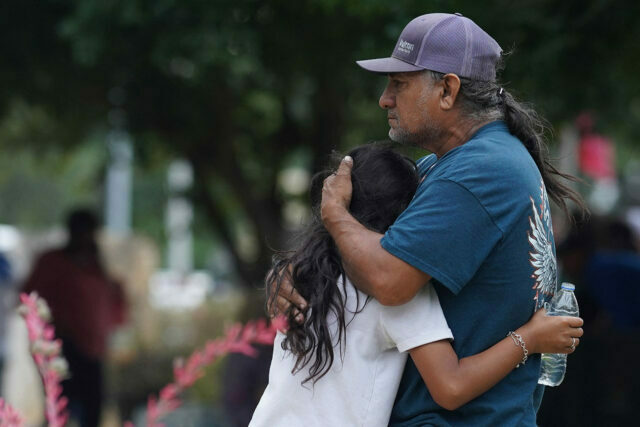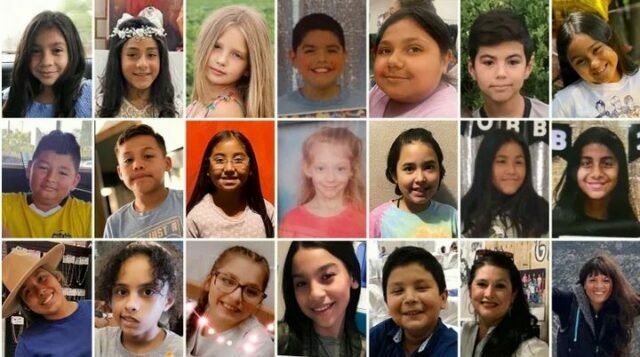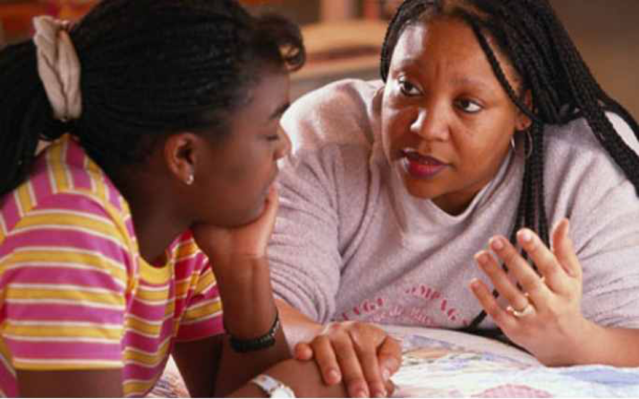Another deadly mass shooting has claimed the lives of 21 individuals. This latest tragedy has many parents tasked with wondering how to talk to kids about gun violence in the wake of the Uvalde, TX shooting.

On Tuesday, May 24, 2022, mere days after the Buffalo, NY mass shooting, an 18-year-old high school student, after shooting his grandmother, stormed Ross Elementary School in Uvalde, TX. The 18-year-old killed 19 students and two teachers. This act of incomprehensible violence occurred in the one place where children spend the majority of their day-school.
“For the majority of students, school is a safe and supporting environment,” Dr. Robin Gurwitch, a licensed clinical psychologist and professor at Duke University Medical Center, told ABC News in 2018, after 17 people, including students, were killed at Marjory Stoneman Douglas High School in Parkland, Florida.
She continued, “So when a shooting happens at a school, it undermines our sort of worldview about where I can be that is a safe place.”

Many parents are trying to make sense of this senseless tragedy themselves and are grappling with how to explain yet another horrific act of gun violence.
Below are some suggestions from the experts, in an interview with People Magazine, on how parents can begin the conversation.

Start the Conversation, Don’t Wait for Them to Bring It Up
Even though it may be hard, jump right into the conversation. Don’t wait on children/teens to start the discussion.
“Make sure [the family] is all together, take a deep breath and jump in,” Dr. Robin Gurwitch, a psychologist and professor at Duke University Medical Center and a member of the People Health Squad, tells People. “It can be as simple as, ‘There was a shooting at a school in Texas, tell me what you’ve heard about it.’ That allows you to find out where the conversation starts and you can listen for any misinformation or misperceptions that they may have about it so that you may gently correct it.”
Dr. Becky Kennedy, a clinical psychologist and the founder of parenting resource Good Inside adds, “I’d remember that kids rarely bring up distressing topics with their words — if an event or news is overwhelming for us to speak about it, imagine how a young child feels — so be on the lookout for increased separation anxiety, sleep struggles, reactivity, tantrums — which may be signs that a child overheard the news and needs your help processing it.”
Do Your Research Ahead of Time
Ensure that you know as many facts as you can about the incident because children are going to ask. You having the right answers will give them a sense of security.
“It’s important for parents to know the information, to be prepared to address questions that may come up. Children may ask how many people died or if the person who did it could hurt someone else, so gathering information from trusted sources is important,” says Gurwitch. “Let them know that even though those feelings are there that you believe you will be able to go forward. You believe that we’re going to be okay. That’s what children are looking for, the reestablishment of a sense of safety and security. We need to be part of that.”
Reinforce the Ideas of Safety and Security at School
For many students, school is their happy place. Although you can not guarantee anything, make sure that you reinforce that the administration of your children’s school is doing the best that they can to ensure that the campus remains as safe as possible.
“For children around the country that are asking you, ‘Is it okay to go to school?’ We can’t promise that nothing will happen. We’ve learned enough over the past many years that we can’t ever make that promise. But what we can say is, ‘Your school is doing everything it can to make sure that you are safe at school.'” Gurwitch said.
Make the Conversation Age-Appropriate
Keep conversations age-appropriate. The amount of details parents should share about an attack depends on the age of the child, says Gurwitch.
“I don’t need to share with my 5-year-old that DNA is being collected. That doesn’t mean anything to them and it can just be scary because they don’t understand the words you’re using. We want to talk to children at a level they can understand.”
Kennedy adds, to Gurwitch’s point, “Kids need parents to be honest with them — and at the same time, we need to remember that honesty isn’t the same thing as flooding. Remember that kids who ask questions are looking for answers. Once a child asks a question about a detail, they’re letting you know that they are worrying about this detail — and we don’t want to leave a child alone with their worries.”
Monitor Your Kids’ Exposure to the News and Media
Coverage of this tragedy has been an almost 24/7. Your children do not need to be exposed to this on a repetitive loop. Encourage them to take a break.
Gurwitch advises, “Do not watch it, do not listen to it, do not discuss it in front of really little children. They don’t understand and they will fill in the blanks and it will be completely wrong. As children get older you want to monitor what they’re seeing on social media, what they’re reading, what they’re seeing on TV.”
For more suggestions on how to talk to kids about gun violence in the wake of the Uvalde, TX shooting, click here. Remember to talk openly with children and let them know how you are feeling. Let them know that they are not alone as we are all trying to make sense of these horrific actions.
Our thoughts continue to be with the families of the deceased and the Uvalde, TX community at large.







